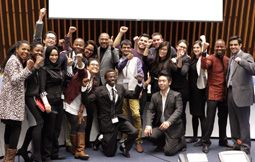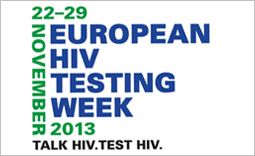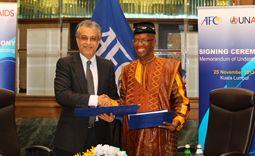
Feature Story
18th International AIDS Conference to open in Vienna
16 July 2010
16 July 2010 16 July 2010
The XVIII International AIDS Conference (AIDS 2010) will begin in Vienna on 18 July. A pivotal year in the AIDS response, it will coincide with a major push for expanded access to HIV prevention, treatment, care and support as 2010 is the target year set by countries to achieve universal access to HIV services and comes ten years after nations committed to the historic Millennium Development Goals.
With the international financial downturn and bleak global economic outlook threatening to undermine public investments, the event hopes to help keep HIV on the front burner, and is a chance to demonstrate the importance of continued HIV investments to broader health and development goals.
“Rights Here, Right Now”
The overarching theme of AIDS 2010 is "Rights Here, Right Now". It highlights that the protection of human rights is a fundamental prerequisite to an effective response to HIV—whether directly involving people living with HIV or particular groups, such as women and girls, men who have sex with men, people who use drugs, sex workers or young people.
AIDS 2010 will provide a multidisciplinary forum for networking and the sharing of information related to new research and evidence-based programmes and policies. It is a chance for the many stakeholders involved in HIV to take stock of where the epidemic is, evaluate recent scientific developments and lessons learnt, and collectively chart a course forward.
HIV epidemics in Eastern Europe and Central Asia
Taking place in Vienna, AIDS 2010 will turn attention towards the growing epidemics in Eastern Europe and Central Asia where an estimated 1.5 million people were living with HIV in 2008, a rise of 66% from 2001. HIV prevalence in the region is also on the rise, with severe and growing epidemics in the Ukraine and the Russian Federation.
One of the highlights of the AIDS response in the region is the high coverage of services to prevent mother-to-child HIV transmission. In December 2008, coverage of services to prevent mother-to-child transmission exceeded 90% in Eastern Europe and Central Asia.
However reaching many of people at higher risk of HIV remains a challenge. Injecting drug use is the main mode of HIV transmission in this region. An estimated 3.7 million people inject drugs, and roughly one in four are thought to be HIV-positive. Evidence suggests that injecting drug users in the region, are often the least likely to receive antiretroviral therapy.
Preventing sexual transmission of HIV prevention will also be high on the conferences agenda. With increasing transmission among the sexual partners of drug users, many countries in the region are also experiencing a transition from an epidemic concentrated among injecting drug users to one that is increasingly characterized by significant sexual transmission.
UNAIDS at Vienna
UNAIDS will be publishing live updates from the conference. UNAIDS @ Vienna blog, on twitter and facebook. During the upcoming week interviews with activists and conference goers on their perspectives of the conference and the AIDS response will also be posted on YouTube.
Vienna partners
The conference takes place every two years and is the largest gathering for those who work in the AIDS response including policymakers, people living with HIV and civil society.
Local and regional partners include the host the City of Vienna, the Government of Austria, Austrian AIDS Society, Aids Hilfe Wien, East Europe & Central Asia Union of PLHIV, European AIDS Clinical Society and the European Commission.
International partners include UNAIDS and its Cosponsors, WHO and the United Nations Office on Drugs and Crime; the International Council of AIDS Service Organizations; the Global Network of People Living with HIV/AIDS; the International Community of Women Living with HIV/AIDS; the World Young Women’s Christian Association; and the Caribbean Vulnerable Communities Coalition.





